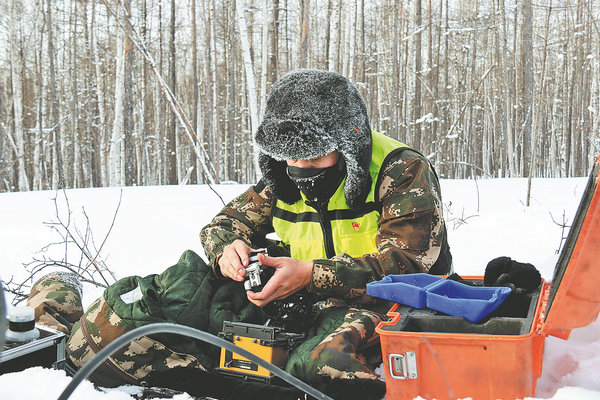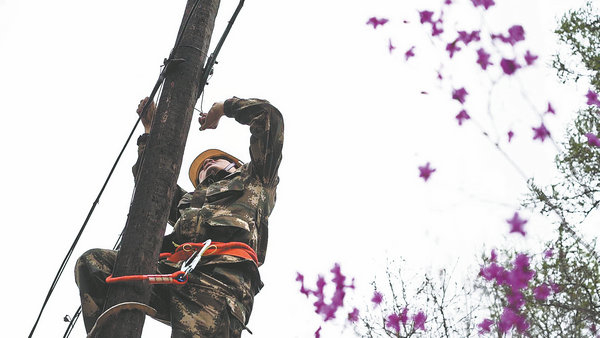Lone technician delivers peak performance

Chai wipes snow off solar panels that supply power for telecommunication base stations in the area. [Photo provided to China Daily]
For signal maintenance technician Chai Ruifeng, Nov 4, 2019, is a day to remember. He set off on what he thought would be a typical day on duty, driving through the primary forests in the north of the Greater Hinggan Mountains carrying out emergency equipment repair.
However, his pickup truck broke down on a snow-covered mountain road, and there was no rescue service available. He was forced to walk for six and a half hours to get help at the nearest telecommunication base station.
"I am finally home, and I'm alive," Chai recalls saying to himself the moment he finally saw a building with its lights on through the dark, cold night.
"My mind went blank, and I kept going. It felt like, in the end, that my legs were taking the steps forward by themselves. As night fell, I was also scared of running into wild animals. When I saw the lights, I felt happier than I'd ever been. Any place with lights on would have felt like a home at the time."

Signal maintenance technician Chai Ruifeng is the only employee at the Moridaga subsidiary office of China Telecom, with his only companion being an Alaskan Malamute. [Photo provided to China Daily]
For 14 years, Chai has been working as a technician at the Moridaga subsidiary office, Hulunbuir branch of China Telecom, in the Inner Mongolia autonomous region. Since 2016, he has been the office's only employee.
Moridaga, a remote border town, has an average annual temperature of around -6 C, and a record low of -56 C.
All year round, Chai roams the primary forests covering 12,000 square kilometers in his pick-up truck, his only companion being an Alaskan Malamute called Hu'niuer.

Chai makes urgent repairs on telecommunication infrastructure in the primary forests in the north of the Greater Hinggan Mountains. [Photo provided to China Daily]
Together, they have been through thick and thin, trudging through the deep snow, camping in the wilderness and occasionally confronting wild animals living in the forests.
The area Chai oversees includes more than 50 base stations, the nearest 10 km from the company, and the farthest 400 km, which takes him eight or nine hours to reach.
Most of these stations are built on the top of mountains and cannot be reached by car. He has to climb the mountain tracks, sometimes as far as 4 km, carrying heavy equipment.
Apart from the long distances and arduous journeys, Chai also constantly faces danger from extreme weather and wildlife.

Chai Ruifeng climbs a utility pole to check and maintain telecommunication cables, as spring brings more risks of fire. [Photo provided to China Daily]
"During most of my trips, I cannot rest, because of the distance and the scarcity of people. Sometimes when I get too drowsy, I get out of the truck and wipe my face with snow, or turn the music up as loud as it can be to keep myself awake," he says.
"In the winter here, the sun sets after 3 o'clock. Once the sky gets dark, I cannot see the tracks clearly, and it gets even more dangerous."
The tracks in the forest region are particularly hazardous, Chai says. In winters, hot spring water freezes and collects on the roads, forming sheets of ice that can extend up to several kilometers and amass as high as several meters.
Drivers who let their guard down might think they are just flat, icy roads, not knowing that there is still running water underneath. Once the ice cracks, the cars will be trapped.
Chai cannot recall how many times he has been trapped on these roads. With no residents nearby and no signal to contact rescue, he has sometimes had to wait for as long as 10 hours overnight in temperatures below — 40 C.
Some of these hardships have lessened since the company equipped him with a satellite phone, but with improved ecological protection, he has been encountering all kinds of wild animals, including bears, wolves and lynxes.
"Once, I looked up and, just 4 meters away, I saw a black bear staring at me. I climbed up the nearest pine tree and waited for the rescue," Chai says.
"It is said that people experience a burst of energy when facing threats. As a result of that experience, I believe it, because, later, I tried to climb that same tree and couldn't."
Persevering with the job is not the result of yearning for adventure. In fact, growing up in Moridaga, he had been bored with the sight of trees and mountains, and longed to leave them to pursue a life in a big city.
His parents persuaded him to apply for the position after he graduated from university, saying that, as a young person, he should find a position where he could realize his value, instead of wanting too much from life.
At first, he worked in a team of 15 people. However, when commercial logging was prohibited, many of his colleagues moved away with their families, members of which had been working in the logging industry.
"With fewer colleagues, I had to take on more responsibilities. But now, when I reflect on these experiences, I feel they are very meaningful. People have to endure hardship in order to grow," he says.
As the only one maintaining and repairing signal infrastructure in the border area, Chai has also become a link between the local border defense soldiers and grassroots workers and their families.
Wang Zhen from Qiqian station, Greater Hinggan Mountains branch of the Inner Mongolia Autonomous Region Forest Fire Brigade, has known Chai for more than 10 years.
He says the team members all consider Chai as an older brother. Every time Chai goes to their station, he always contacts them, and nearby residents, in advance to ask if they need him to buy anything for them.
"Through our conversations, I know that he wanted to become a soldier as a child. I feel that, although he is not one, he has a soldier's qualities, such as resolution and willpower in the face of challenges," Wang says.
Wang remembers one incident vividly. It happened in December 2015, when their station lost its signal. Chai ran some tests and found that the fiber-optic cables had been broken more than 20 km away. For an entire week, he took a few firefighters out with him early in the morning, dug the cables out and fixed them.
"There were many such occasions, which we thought we faced an impossible task, but he persisted as long as he could see a glimmer of hope," Wang adds.
For the past decade, Chai has observed changes in the region: Roads are being laid and improved, more telecommunication base stations have been built, and it is easier for the residents to contact others or use the internet.
"Although I'm the only one who has stayed here for 14 years, I am never alone, as I've always been supported by my family, the locals and the company," Chai says.
"It is my mission to work among the forests. There is still a lot to be done. For me, the fundamentals are to do my job well and be a responsible and useful member of society."



 Print
Print Mail
Mail





